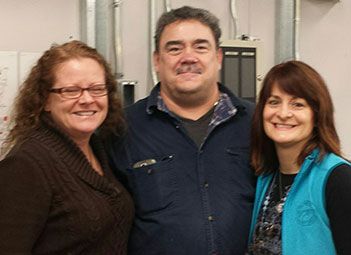Upping Our Game – Tools for Effective Union Leadership
- Details
- Published: February 26, 2015

By Monika Warner, Region III Assistant, Chapter WA3 President and Region III PR Committee Member
As a full-time union leader and volunteer, I think a lot about our union. I believe that I’m working really hard to put in as many hours as the clock permits. I also believe that I am well informed and have great ideas. But I just keep wondering, why hasn’t membership soared? Why isn’t my chapter flourishing with activism and volunteers? In the worksite meetings and after-hours events around Region III, why aren’t we going home with stacks of membership applications from each visit for proof of time well spent? The truth is that relationships take time. One of the many quotes that stay with me from my quest for self-development is that “people don’t care what you know, till they know that you care.”
Our challenge as union leaders is to convey compassion and build trust in the few minutes or hours we spend at the worksite. Our first impressions are lasting impressions and one-on-one conversations are essential in growing our union. Nothing of real value ever comes easy. I want employees to become members who believe we are stronger together than alone, who appreciate the complexity and importance of the challenges we face together, and who offer the support necessary for the union to succeed. As current and hopefully future members, we should be using our voices to mold our union.
Those of us in the Pacific Northwest know that the “winter” with its abundance of rain is a really good time to stay inside, attend classes and sharpen our tools. Region III leaders Joan Matthiesen, Larry Ferington, and I recently attended “Upping Our Game – Tools for Effective Union Leadership” in Portland, Ore. The spiral-learning model utilized interaction and workshops. We discussed the roles of union leaders and identified how the challenges have changed, reflected on what experiences have shaped who we are as union leaders, and practiced “telling our story.” We delved into communications and the importance of member involvement, which included analyzing barriers to participation and brainstorming the best ways to encourage activism. Describing the opportunities in “Upping Our Game,” Ferington, who is a member of Chapter OR3 and serves as the Northwest Oregon SSC rep, encourages membership to participate. “There's always something to get involved with, just ask. Be a part of PASS and get involved.”
As we developed our own personal visions, we each asked ourselves some questions. What do I want for my members? What inspires me? What am I trying to build? What gives me energy or joy? Matthiesen, who is a Region III assistant, agreed with a fellow union leader who emphasized that the agenda is up to the membership. “Your membership will not support you if your plan or vision does not resonate with them,” she said. “You have to know what their issues and concerns are if you want to get them involved and active, so being a better listener is the first skill a leader needs to develop.”
We proudly recognized the cross-section of ages, ethnicity, gender and professions represented in our class. The 25 passionate leaders were a true reflection of the American workforce. They were dedicated to their union vision and humble enough to seek further understanding and personal growth. I have no doubt that our unions are committed to meeting the challenges of today and tomorrow! Similarly, I believe each of us that truly cares about PASS owes it to ourselves and our union to strive for continuous improvement. As leaders, we must take the time to connect with our workforce, listen to members, identify and inspire activists, and create a shared vision for the future of PASS where everybody belongs. Please share this message with nonmembers and encourage them to join us on our journey!
If you’re interested in learning more about union studies and opportunities for personal development, check out your local labor council. Through these affiliations, we can create an instant network of labor friends, share our experiences and help our unions succeed together.




